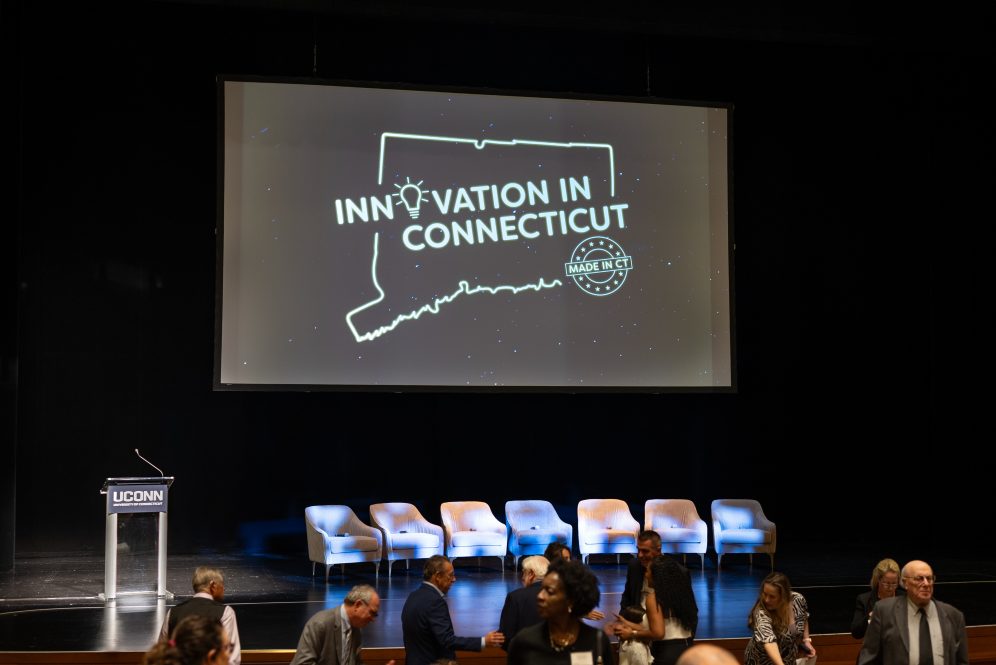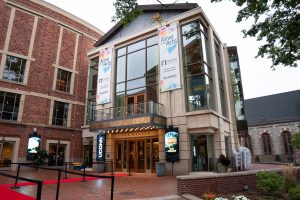'UConn has been at the heart of our innovation for many years, and we need it more now than ever'

"Innovation in Connecticut," a project initiated by UConn President Radenka Maric and directed by filmmaker and Associate Research Professor Zeljko Mirkovic, premiered Sept. 25 at The Bushnell in downtown Hartford. (Defining Studios Photo)
Connecticut's rich culture of innovation and UConn's integral place in its past and future successes are on display in a new documentary, which drew about 400 guests to a recent premiere event in Hartford and prompted a thought-provoking panel discussion afterward.
"Innovation in Connecticut," a project initiated by UConn President Radenka Maric and directed by filmmaker and Associate Research Professor Zeljko Mirkovic, premiered Sept. 25 at The Bushnell in downtown Hartford.
It was followed by a panel in which participants examined the unique assets that make Connecticut such a strong incubator for research and innovation, and how to capitalize on those strengths moving forward.
Connecticut Gov. Ned Lamont, an early entrepreneur in the cable and satellite industry, told the crowd that while Connecticut is rightfully proud of its centuries of innovation, the years ahead provide unique potential for the discovery and development of new world-leading technologies.
And UConn, he said, "is the heart and soul of everything we're trying to do here."
"The trick for innovation is that you can't always be looking in the rearview mirror; you have to be looking forward. UConn has been at the heart of our innovation for many years, and we need it more now than ever," Lamont said. "The last 20 years and the next 20 years are going to be absolutely transformative in terms of innovation and thanks to UConn, we're going to be front and center."
The State of Connecticut launched its new "Make It Here" initiative in fall 2023 and focuses on the state's identity as an incubator for creators, makers, innovators, and entrepreneurs. The "Innovation in Connecticut" documentary was created to underscore that message and UConn's integral role in supporting entrepreneurship, innovation, and creativity, which is a key part of the University's Strategic Plan.
Maric, an internationally recognized clean-energy research innovator with multiple patents and countless scholarly works to her credit, said students are at the center of UConn's mission to help move Connecticut forward.
"My vision for UConn is for the University to be the best version of itself, and that means focusing on students and letting them innovate together with our faculty," she said. "Students really are the engine for innovation, and we have to mentor them and lead them -and we also have them to lead us."
Maric was joined at the documentary premiere by many of those students, including several who are active in the UConn Peter J. Werth Institute for Entrepreneurship & Innovation, which led the documentary's development.
The documentary project also garnered more than $42,000 in sponsor support from companies, organizations, and individuals.
Peter Werth, whose vision shapes the institute that bears his name and who has been a steadfast supporter of many highly impactful UConn programs, also attended the premiere and received especially hearty applause from the audience when he was introduced.
Other attendees included business leaders, successful and aspiring entrepreneurs, state and local officials, experts in intellectual property and patent law, specialists in the transfer of technology from research labs to startup industries, and myriad others.
Several of the panelists also were featured in the film, including Maric; longtime former U.S. Sen. Christopher J. Dodd; entrepreneur and philanthropist Trisha Bailey '99 (CLAS); panel moderator Michael Cantor '83 LAW, co-managing partner of Cantor Colburn LLP; former state Sen. Toni Boucher '02 MBA, Wilton's current first selectman and a noted business leader and philanthropist; Matt McCooe, chief executive officer of Connecticut Innovations; and David Noble, the Werth Institute's director and an associate professor in residence in the UConn School of Business.
Bailey, who grew up in poverty and attended UConn as a cross-country and track and field athlete on a scholarship, later went on to found her own business, Bailey's Medical Equipment and Supplies. Now, she has business ventures stretching across multiple states and two countries and is the richest Jamaican-born woman in that country's history.

As she told the panel's audience, UConn saw beyond what might have appeared on paper to be a lackluster high school academic performance - and instead, her coaches and other mentors helped her develop her natural skills, build those she had previously lacked, and blaze her own path.
"I know that many universities today use standardized exams as a methodology to judge whether or not you qualify … (but) with UConn having seen the other talents that I had, it was truly the centralized focus of who I am today. That's the reason why my heart and my soul and everything that I am belongs to the University of Connecticut," she said.
Panelists also discussed how to foster innovation and economic growth while ensuring that legal protections are also in place, both for the U.S. as the home of that innovation and those who develop it; and as a global citizen that benefits from technological advances worldwide, but can't allow itself to be outpaced by them.
"Striking that balance is the challenge of our time. If it's just one or the other, then we run a great risk. We need trade, obviously, but we also need to protect our intellectual property," Dodd said.
"One of the things that built this country and this state is immigration. I know today it's a hot political subject … Particularly in the early part of our country's history, people came to Connecticut and this country (with) the idea of being able to be free, to be able to express yourself, to practice your religion," he added.
"All of these elements, while they may not directly address the issue of patents and innovation, they contribute to it: to be able to live in a free country and free state where your ideas and thoughts are welcome, not challenged and threatened.
"No one is suggesting, by the way, that we ought to not have safe and secure borders. But I hope we don't fail to realize that the contributions of people who came to our country and built our country should not be forgotten in this history, and Connecticut was certainly a great beneficiary of that," Dodd said.
Boucher, whose experience in business and as an elected official at the local and state levels has given her a unique perspective on fostering entrepreneurship, had several specific suggestions to support Connecticut's continued economic growth.
They include reassessing whether some regulatory and tax procedures may be adding hurdles to growth, how tax credit programs can help young businesses get off the ground, incentivizing angel investors, making it easier to navigate the business licensing and financing landscape, and others.
"I could go on and on, and I won't - but in my view, the best social justice program is creating job opportunities for everyone at every level of the economic ladder so they can elevate and better their lives, and in turn improve the economy of where they live," Boucher said.
"This is what I hope we'll be instilling in students passing through the classrooms of the UConn School of Business and the many other departments of Connecticut's premiere educational institution," she added. "What students do with those opportunities really up to them, but I tell them that there is power in persistence."
In fact, those messages of persistence and creativity are among those at the heart of the UConn Werth Institute for Entrepreneurship & Innovation, where Noble's role as the institute's director includes bringing its namesake's vision to life as a place that engages students from all disciplines.
"When Peter (Werth) created that gift, he had a very clear direction: to serve students where we found them. Instead of making them come to us to get into entrepreneurship programs, we go to them," Noble said. "We've built a lot of programming at the top of the UConn entrepreneurship model to grow entrepreneurship education and opportunities all across the university."
One of the particularly important organizations in supporting and expanding Connecticut's economic vitality is Connecticut Innovations, a quasi-public agency that acts as the state's venture capital arm and offers equity investments, strategic guidance, and other support.
Matthew McCooe, its chief executive officer, noted that creating an ecosystem of support sets the foundation for Connecticut to help its entrepreneurs reach high levels.
"The foundation of everything that Connecticut does is our knowledge workers, and it's the workers that come out of UConn and all of the other fantastic universities and high schools that are here in the state," McCooe said. "The key to everything that we do is trying to identify the next great entrepreneur."
He noted the experiences of Dr. Vlad Coric, '92 (CLAS), founder and CEO of Biohaven Pharmaceutical Holding Company Ltd., which developed the highly successful Nurtec migraine prevention and treatment therapy.
Coric, who is featured in the "Innovation in Connecticut" documentary, came to Connecticut Innovations (CI) after being turned down by many of the top venture capital organizations in the world, McCooe said.
Coric went on to establish the pharmaceutical company – which was later acquired by Pfizer in a deal estimated at over $11 billion - and is now on his second venture as head of Biohaven Ltd., which was spun off during the Pfizer purchase.
"It's a wonderful example of that circular economy we have in Connecticut where people start at UConn, they go out in the world and become great successes, and then they come back and do it a second time and a third time," McCooe said.
Cantor, whose widely known enthusiasm for Connecticut was also evident as moderator of the night's panel, noted the ambition that all of the entrepreneurs in the film displayed: "UConn grads, like Vlad and others - we're hungry. We're really hungry and we stay hungry, and that's the key, I think, to being a successful entrepreneur."
Cantor and his business partner, Phil Colburn, launched their intellectual-property law firm in Hartford in 1968 despite the doubts from some naysayers who encouraged him to set up headquarters in other states.
As one of Connecticut's most steadfast supporters, he says he's never regretted his decision and encourages others to embrace all that the state offers: "Moving forward in entrepreneurship is a state of mind: Drop the naysay and the pessimism and think big, think optimistically," he said.
Bailey struck an equally optimistic note, encouraging UConn students in the audience to dig deep to discover and nourish their aspirations - and to use all of the University's resources and support in that path.
"I would tell students: Focus on developing yourself. Focus on giving every single thing all that you have. Work as hard as you possibly can. The only way you can know if you truly are good at something is if you give it your entire energy," Bailey added.






